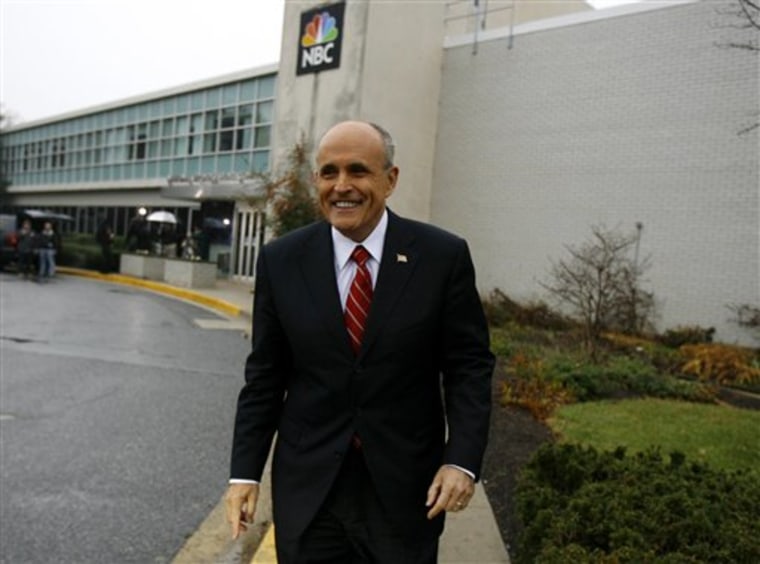Former New York Mayor Rudy Giuliani on Sunday defended the expenses incurred by his security detail as he was beginning an extramarital affair with current wife Judith Nathan, saying police made the decision after she received threats.
Giuliani in recent weeks has faced a barrage of questions about New York police security costs for his trysts with Nathan and about his business clients, which have included the Persian Gulf country of Qatar. Although a U.S. ally, Qatar is accused of sheltering suspected Sept. 11 mastermind Khalid Sheikh Mohammed.
Smiling broadly and laughing at some of the tougher questions put to him on NBC's "Meet the Press," Giuliani did not directly answer when asked why the security expenses were billed to obscure city offices, making their detection more difficult. He responded that the NYPD had deemed the security detail necessary because of threats against him and his loved ones, including Nathan.
"This was all based on threat assessments by the New York city police department, all based on their analysis to protect her life, my life, other people's lives," Giuliani said. "They made the choice. My wife Judith would honestly prefer not to have security."
Security costs dispersed
Records first reported by Politico.com last month showed repeated trips between 1999 and 2002 to Long Island, where Nathan had a condominium. Giuliani's first trip was from Aug. 31 to Sept. 1, 1999 — months before he acknowledged the breakdown of his second marriage in the spring of 2000.
Security costs for those trips were charged to agencies like the New York City Loft Board, which regulates loft apartments and was billed $34,000. The Office for People with Disabilities was charged $10,000, while the Assigned Counsel Administrative Office, which provides lawyers for indigent defendants, was charged roughly $400,000.
Asked whether it would be appropriate for a president to provide taxpayer-funded security for a mistress, Giuliani said it would not. But he said "that isn't the right way to analyze it" in his case.
"The reality is it all came about because of my public position," Giuliani said. "The New York city police department has rules, they apply the rules. They apply it exactly the same way as they always apply it."
"I did not make the judgment. I didn't ask for it. Judith didn't particularly want it," he said. "It was done because they took the view that it was serious and that it had to be done this way."
Shift in Giuliani strategy
The decision to do a lengthy, nationally televised interview marked a shift in strategy for Giuliani, similar to those by GOP rival Mitt Romney and Democratic front-runner Hillary Rodham Clinton as the campaign for president has tightened in both parties. After resisting for months, Romney, a Mormon, relented and gave a speech about his religious faith while Clinton sharpened her criticism of Barack Obama, her closest rival.
Regarding his post-mayoral business dealings, Giuliani has refused to outline his role or identify clients of his firm, Giuliani Partners. In an interview last month with The Associated Press, he said the media have vetted most of his clients but that he can't name them because of confidentiality agreements.
Giuliani had income of $4.1 million from his share in Giuliani Partners and $1.2 million from his law firm between January 2006 and February 2007, according to financial disclosure forms he filed in May.
On Sunday, Giuliani did not deny he was still receiving money from Giuliani Partners, but said he was not involved in the company's day-to-day operations and that he has "severed every tie I can think of."
Releasing a client list was unnecessary, Giuliani said, because "every client of GP of any significance while I was there, while I was involved in the day-to-day operations has been discussed" in the media or other public forums.
"The reality is none of them amount to anything other than ethical, lawful, decent work," he said. "None of them involve any conflict of any kind."
Giuliani also acknowledged errors by not screening former protege Bernard Kerik closely enough before making him city police commissioner in 2000. Kerik, whom Giuliani later recommended unsuccessfully to head the federal Department of Homeland Security, was indicted last month on counts including accusations of lying to the White House and filing false income tax returns. Kerik has pleaded not guilty to the charges.
"I think my judgment on appointments turns out almost always to be very good with unfortunately some mistakes that I have made," Giuliani said. "This is one of them, and I'm really sorry for it and I have learned from it."
